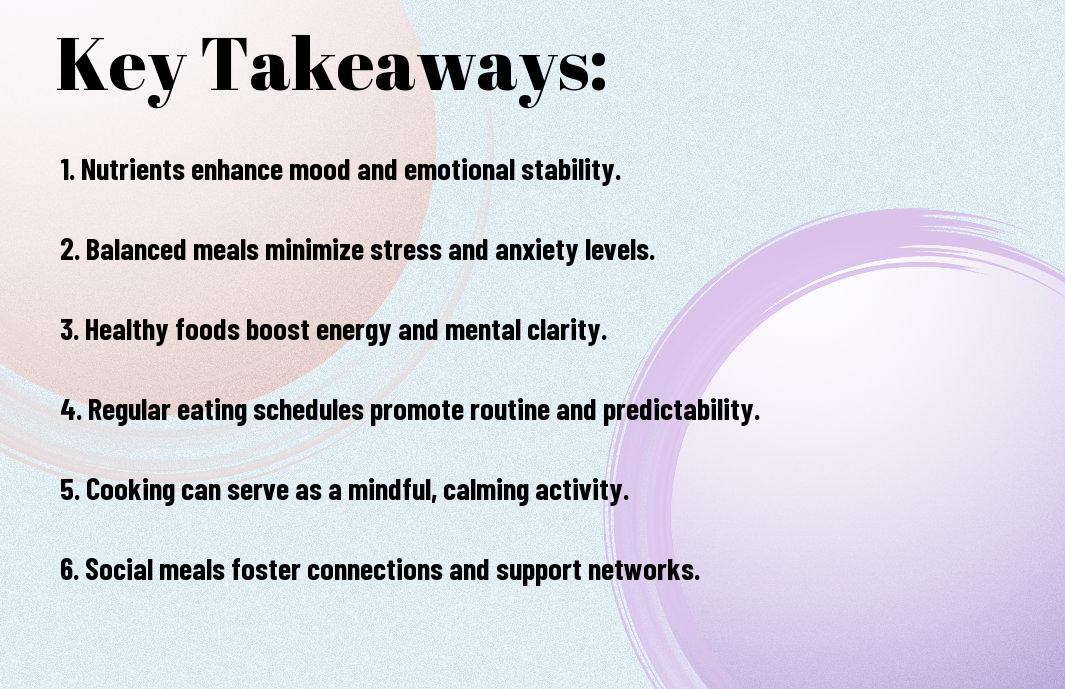Just as a well-tuned instrument produces harmonious music, balanced diet strategies can create a foundation for inner peace and resilience in your life. By incorporating a variety of whole foods, such as fruits, vegetables, and lean proteins, you can enhance your physical and mental well-being. This holistic approach not only fuels your body but also supports emotional stability, reducing anxiety and promoting clarity. Learn how the right nutritional choices can empower you to navigate life’s challenges with greater strength and composure.

Key Takeaways:
- A balanced diet can enhance mood and emotional stability, contributing to a sense of inner peace through the provision of imperative nutrients that support brain health.
- Consuming a variety of foods helps to foster resilience by improving overall physical health, which in turn boosts energy levels and the ability to cope with stressors.
- Mindful eating practices associated with a balanced diet encourage individuals to connect with their bodies and emotions, promoting mental clarity and a deeper sense of well-being.
Understanding Balanced Diet
The foundation of a balanced diet lies in providing your body with the right amounts of nutrients it needs to function optimally. A balanced diet encompasses a variety of foods from all food groups, ensuring that you receive imperative vitamins, minerals, and energy required for physical and mental well-being. By making informed food choices, you can enhance your resilience and foster a sense of inner peace.
Definition of a Balanced Diet
About a balanced diet, it is defined as the intake of different foods and nutrients in specific proportions tailored to meet your body’s needs. This dietary approach emphasizes moderation, variety, and nutrient diversity, which contribute to maintaining good health and preventing chronic diseases.
Components of a Balanced Diet
Between the various components of a balanced diet, you’ll find proteins, carbohydrates, fats, vitamins, minerals, and water. Each component plays a vital role in your overall health, supporting everything from energy production to growth and repair of tissues.
This balance in your diet is significant because inadequate or excessive intake of certain foods can lead to malnutrition, obesity, and other health issues that may impact your mental and physical resilience. Proteins are imperative for tissue repair, while healthy fats provide energy and help absorb vitamins. On the other hand, carbohydrates serve as your body’s main energy source. Incorporating a wide array of fruits and vegetables ensures you get a blend of vitamins and minerals that support immune function and reduce stress. Pay attention to your nutrient intake to enhance both your physical health and inner peace.

The Psychological Effects of Nutrition
Some studies indicate that what you consume directly influences your mental well-being. Nutrients from food can affect brain chemistry and consequently impact your mood, stress levels, and overall mental health. A balanced diet can help stabilize your emotions, enhance your cognitive abilities, and support your resilience against life’s challenges. This connection between food and your psychology is vital for achieving and maintaining inner peace.
Nutritional Psychiatry
Behind the term “nutritional psychiatry” lies the exploration of how dietary choices can influence mental health disorders. This growing field emphasizes that by making conscious decisions about what you eat, you may prevent or alleviate symptoms of conditions such as depression and anxiety. Whole foods rich in vitamins, minerals, and omega-3 fatty acids could enhance your mood and cognitive function.
Mood Regulation and Food Choices
Nutrition plays a significant role in regulating your mood through the food choices you make. Foods high in sugar and unhealthy fats can lead to mood swings and fatigue, while a diet rich in fruits, vegetables, whole grains, and healthy fats may enhance your emotional stability. Research suggests that a well-balanced diet can elevate serotonin levels, positively affecting your mood. By choosing nutrient-dense foods, you nurture not only your body but also your mind, fostering resilience and peace.
This relationship between your mood and food choices illustrates that the power of nutrition extends beyond physical health. Incorporating whole, unprocessed foods into your diet can result in noticeable improvements in your emotional state, as these foods provide the necessary nutrients necessary for optimal brain function. Furthermore, adequate hydration and balanced macronutrients can bolster your overall mood stability, making it easier for you to face daily challenges. By prioritizing a healthy diet, you’re investing in a robust mental environment that supports peace and resilience.
Inner Peace Through Dietary Choices
Keep in mind that your dietary choices can significantly impact your emotional well-being. By prioritizing a variety of nutrient-dense foods, you create a sense of balance that nurtures both body and mind. This intentional approach can foster inner peace, allowing you to feel more centered and grounded in your everyday life.
Mindful Eating Practices
Above all, practicing mindful eating encourages you to savor each bite and reconnect with your food. By tuning into your hunger cues and appreciating the flavors and textures, you enhance your experience, reduce stress, and promote an overall sense of calm. This thoughtful approach can help you develop a healthier relationship with food.
Foods That Promote Calmness
Eating certain foods can play a significant role in promoting calmness and reducing anxiety. Omega-3 fatty acids found in fatty fish like salmon and chia seeds, magnesium-rich foods such as spinach and nuts, and antioxidant-packed fruits like blueberries can help alleviate stress. Incorporating these into your diet can support your mental clarity and emotional balance, leading to a more tranquil state of mind.
Peace is found in the foods you choose to nourish your body. Including items rich in tryptophan, like turkey and bananas, can enhance serotonin production, promoting relaxation. Foods that are low in sugar and high in fiber, such as whole grains and legumes, help stabilize your blood sugar levels, which contributes to emotional stability. Avoiding processed foods high in trans fats can also prevent feelings of irritability. By embracing these foods and forming conscious eating habits, you can cultivate a deeper sense of calm and resilience in your life.
Building Resilience with Nutrition
Despite the challenges you face, a well-balanced diet can significantly enhance your resilience. The foods you consume not only fuel your body but also influence your mental fortitude. When you nourish yourself with wholesome and nutrient-dense foods, you cultivate a foundation for optimal physical and mental performance. This ultimately empowers you to better navigate life’s stressors, fostering inner peace and enhanced coping strategies.
The Role of Micronutrients
The role of micronutrients in your diet cannot be overstated when it comes to building resilience. Vitamins and minerals, such as Vitamin C, magnesium, and zinc, play a vital role in supporting your immune system and reducing stress. By ensuring your intake of these crucial nutrients, you promote not only physical health but also emotional balance, aiding your ability to effectively cope with adversity.
Dietary Strategies for Stress Management
Among the effective dietary strategies for managing stress, focusing on whole foods is paramount. Incorporating fruits, vegetables, whole grains, and healthy fats can positively impact your mood and energy levels. Avoiding processed foods and excessive sugar is equally important, as they can heighten feelings of anxiety and fatigue. Additionally, mindful eating helps you connect with your food, promoting relaxation and awareness during meals. To maximize these benefits, consider regular meal timings to stabilize your mood and maintain energy throughout the day.
Strategies like increasing your intake of Omega-3 fatty acids, found in fish and flaxseeds, are beneficial for mental health and stress relief. Including fermented foods rich in probiotics can enhance gut health, supporting your overall well-being. Cultivating a balanced diet also means ensuring adequate hydration, as dehydration can lead to irritability and fatigue. By implementing these dietary choices, you build a personal toolkit for stress management and boost your resilience in facing daily challenges.
Intersection of Diet and Mental Health
Not only does what you eat impact your physical health, but it also plays a significant role in your mental well-being. The connection between diet and mental health demonstrates that nutrient-rich foods can enhance your mood and cognitive function, while poor dietary choices may contribute to emotional distress and anxiety. By cultivating a balanced diet, you foster a positive mental state, empowering you to face daily challenges with resilience.
Gut-Brain Connection
For many, the influence of the gut on mental health may come as a surprise. Research reveals that the gut microbiome can produce neurotransmitters like serotonin, which helps regulate your mood. Keeping your gut healthy through a balanced diet rich in fiber, probiotics, and nutrients can enhance your mental clarity and emotional stability.
Impact of Processed Foods on Mood
Foods that are heavily processed often contain high levels of added sugars, unhealthy fats, and preservatives, which may lead to mood fluctuations and increased feelings of anxiety.
Even small adjustments to your diet can lead to significant changes in your mood. Consuming excessive processed foods can result in imbalances in brain chemistry, potentially leading to feelings of depression and irritability. In contrast, a focus on whole, nutrient-dense options can help stabilize your mood and promote a sense of well-being. You should strive to minimize your intake of such foods to optimize both your physical and mental health.
Integrating Balanced Diet Strategies
Once again, adopting a balanced diet can significantly enhance your sense of inner peace and resilience. By implementing these strategies into your daily routine, you can foster a healthier relationship with food and yourself. Focus on incorporating diverse foods that nourish your body and support emotional well-being, creating a foundation for a more harmonious life.
Practical Meal Planning Tips
Strategies for meal planning can simplify your journey towards a balanced diet. Here are some practical tips to keep you on track:
- Plan your meals for the week to avoid last-minute unhealthy choices.
- Prepare a shopping list based on balanced nutritional needs.
- Incorporate a variety of whole foods in your diet.
- Set aside time for bulk cooking and meal prep.
- Keep healthy snacks accessible to curb cravings.
Thou can transform your eating habits with intentional planning.
Overcoming Barriers to Healthy Eating
Healthy eating can sometimes seem challenging due to various barriers. You may find yourself contending with busy schedules, lack of cooking skills, or social pressures. Addressing these obstacles head-on is vital for your journey towards a balanced diet.
Hence, understanding the complexities of food access and personal motivation is vital. You may encounter time constraints that make meal prep difficult or face challenges ignited by emotional eating in social situations. Discovering ways to navigate these issues, such as seeking support from others or exploring quick, easy recipes, can empower you. You can create a resilient mindset around food choices by addressing these barriers and prioritizing your health initiatives.
Final Words
The strategies of a balanced diet play a significant role in fostering your inner peace and resilience. By nourishing your body with a variety of wholesome foods, you equip yourself with the necessary nutrients needed for optimal mental and emotional well-being. This approach not only enhances your mood but also empowers you to better cope with life’s challenges. As you embrace balanced eating habits, you’ll discover a deeper sense of harmony within yourself, leading to a more resilient and peaceful existence.
Q: How does a balanced diet contribute to mental well-being?
A: A balanced diet plays a significant role in enhancing mental well-being by providing important nutrients that support brain function. Nutrients such as omega-3 fatty acids, antioxidants, and vitamins are vital for neurotransmitter regulation and cognitive health. When the body receives the right balance of carbohydrates, proteins, fats, vitamins, and minerals, it can lead to improved mood, reduced anxiety levels, and increased resilience against stressors. This improved mental health fosters a sense of inner peace and allows individuals to respond to challenges with a more balanced emotional state.
Q: What role does meal planning play in fostering resilience?
A: Meal planning is an effective strategy that encourages individuals to make intentional food choices, leading to a consistent nutrient intake important for mental and physical health. By planning meals in advance, individuals can ensure they include a variety of whole foods, which can help stabilize energy levels and mood. This structured approach reduces the likelihood of impulsive eating, which can often lead to unhealthy choices and associated feelings of guilt or stress. As a result, meal planning contributes to building resilience by equipping individuals with the tools to handle life’s pressures more effectively.
Q: Can mindful eating practices enhance the benefits of a balanced diet?
A: Yes, mindful eating practices can significantly enhance the benefits of a balanced diet by promoting a deeper connection between individuals and their food. Engaging in mindfulness while eating encourages a focus on the sensory experiences of food, fostering appreciation and understanding of its impact on overall health. This practice not only helps individuals make more conscious and healthier food choices but also cultivates a sense of calm and reduced anxiety during meal times. As a result, integrating mindful eating with a balanced diet supports inner peace and strengthens resilience, leading to a more harmonious relationship with food and better emotional well-being.

